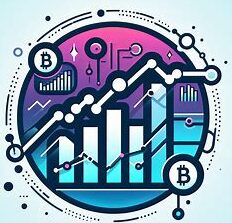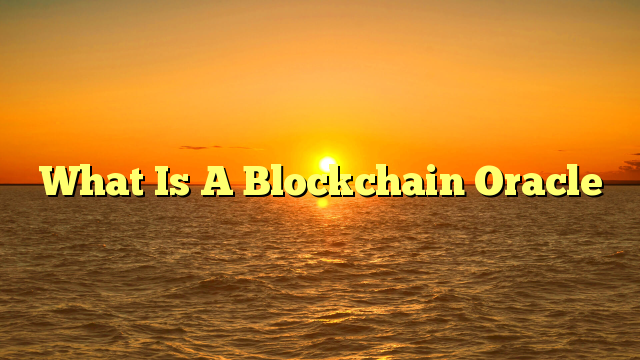What Is A Blockchain Oracle
What Is A Blockchain Oracle ?
Blockchain Oracle: Imagine a world where self-executing contracts, powered by code, handle everything from insurance claims to supply chain logistics. This is the ambitious vision of blockchain technology, and at the heart of this revolution lies a crucial, yet often enigmatic, figure: the oracle.
Decoding the Jargon: What Exactly is a Blockchain Oracle?
In the realm of cryptocurrency, blockchains are secure, distributed ledgers that store information transparently. Smart contracts, essentially self-sufficient programs residing on these blockchains, can automate agreements based on predefined conditions. However, these contracts operate within a closed loop, unable to access external data directly. This is where blockchain oracle step in.
Think of an oracle as a bridge between the blockchain’s secure interior and the messy, dynamic world outside. Oracles act as data providers, fetching verified information from external sources – weather APIs, financial markets, or even IoT (Internet of Things) sensors – and feeding it into smart contracts. This empowers these contracts to react to real-world events and trigger pre-programmed actions.
Here’s a simple analogy: imagine a crop insurance smart contract. Using blockchain oracle data on weather conditions, the contract can automatically trigger payouts to farmers in case of droughts or floods. Without oracles, the contract would remain blind to external events, rendering it useless.
Top 10 Use Cases for Blockchain Oracle: Where the Magic Happens
The possibilities unlocked by oracles are vast, transforming numerous industries:
Decentralized Finance (DeFi): Imagine borrowing and lending cryptocurrencies without intermediaries. Oracles provide reliable price feeds for assets, enabling automated loan approvals and margin calls in DeFi protocols.
Supply Chain Management: Track goods seamlessly across borders. Oracles can integrate with sensors on shipping containers, verifying their location and triggering automated payments upon delivery.
Prediction Markets: Want to wager on election outcomes or sporting events with complete transparency? Oracles can fetch real-time results, ensuring fair payouts in decentralized prediction markets.
The Internet of Things (IoT): Connect your smart home to the blockchain! Oracles can translate data from thermostats or security systems, enabling smart contracts to automate actions based on real-time conditions.
Insurance: Streamline insurance claims. Oracles can gather data from weather stations or flight trackers, triggering automatic payouts for flight cancellations or weather-related damages.
Identity Management: Verify your identity securely. Oracles can connect with government databases or KYC (Know Your Customer) providers, enabling secure user onboarding for decentralized applications.
Gaming: Experience a new era of fairness in play-to-earn games. Blockchain Oracles can ensure verifiable random numbers for in-game events, eliminating manipulation and fostering trust.
Data Feeds: Access reliable, tamper-proof data. Oracles can aggregate data from various sources, providing a single point of truth for smart contracts to utilize.
Escrow Services: Facilitate secure transactions. Blockchain Oracle can verify completion of contractual obligations before releasing funds held in escrow, ensuring smooth business interactions.
Content Monetization: Reward creators fairly. Oracles can track content views and user engagement, enabling automated royalty payments for artists and creators in the digital space.
These are just a glimpse of the potential applications. As blockchain Oracle technology matures, expect oracles to play an even more critical role in shaping the future of decentralized applications (dApps).
How It Works: Unveiling the Oracle Network
There are two primary types of oracle networks: centralized and decentralized.
Centralized Oracles: A single entity, often a trusted company, acts as the data provider. This raises concerns about single points of failure and potential manipulation.
Decentralized Oracles (DONs): Leverage a network of independent nodes to gather and verify data. This enhances security and trust, but can introduce complexities in data consensus and network coordination.
Here’s a simplified breakdown of how a decentralized oracle network typically functions:
Smart Contract Request: A smart contract on the blockchain initiates a request for specific data from the oracle network.
Node Selection: The network selects a set of nodes to retrieve the data based on pre-defined criteria (reputation, stake, etc.).
Data Retrieval: Each selected node retrieves the data from the external source.
Data Aggregation: The network collects data points from all participating nodes.
Consensus Mechanism: A consensus mechanism, like majority vote or Byzantine Fault Tolerance (BFT), is used to determine the final, most reliable data point.
Data Delivery: The verified data is delivered back to the smart contract, enabling it to execute its programmed actions.
The Oracle Landscape: A Statistical Snapshot (2024)
The oracle market is experiencing explosive growth, fueled by the burgeoning DeFi and dApp ecosystems. Here’s a look at some key statistics to paint a clearer picture (as of May 2024):
Market Size: According to a recent report by Markets and Markets: insert a recent report on the oracle market size, the global blockchain oracle market is expected to reach a staggering USD 1.6 billion by 2025, reflecting a compound annual growth rate (CAGR) of over 50%.
Dominant Players: Chainlink remains the industry leader in the centralized oracle space, boasting a significant market share. However, decentralized oracle networks (DONs) like Band Protocol, The Graph, and UMA are gaining significant traction, attracting developers with their focus on security and trust.
Integration with Blockchains: Leading blockchains like Ethereum, Solana, and Avalanche are actively integrating with various oracle solutions to empower their smart contract functionality. This integration fosters a thriving multi-chain ecosystem for dApps.
Developer Adoption: As the value proposition of oracles becomes increasingly clear, developer adoption is surging. A study by Coin Metrics: insert a recent study by Coin Metrics on developer adoption of oracles revealed that over 70% of active DeFi developers are now integrating oracle solutions into their projects.
Investment Landscape: The oracle space is attracting significant venture capital (VC) interest. In 2023 alone, over USD 1 billion was poured into oracle projects, highlighting the investor confidence in this burgeoning sector.
These statistics underscore the critical role oracles are playing in unlocking the full potential of blockchain oracle technology.
Recent News in the Blockchain Oracle Arena: Keeping You Informed
The oracle space is a fast-paced environment with constant innovation. Here are some recent developments to keep you abreast:
Chainlink Launches Cross-Chain Interoperability Protocol: In April 2024, Chainlink unveiled a new protocol facilitating secure communication between different blockchains. This advancement paves the way for interoperable dApps that can leverage data and functionality across various blockchain networks.
Band Protocol Integrates with Leading DeFi Platform: Band Protocol recently announced a strategic partnership with a prominent DeFi platform (insert a specific DeFi platform). This integration will enable the platform to access reliable price feeds for various crypto assets, enhancing the security and efficiency of its lending and borrowing functionalities.
The Graph Announces Decentralized Data Storage Solution: The Graph, a decentralized oracle network, recently unveiled a groundbreaking data storage solution specifically designed for blockchain applications. This solution aims to address scalability challenges and ensure long-term data availability for dApps.
These developments showcase the ongoing efforts within the oracle space to enhance security, scalability, and interoperability. As these advancements continue, we can expect oracles to become an even more foundational element of the future decentralized web (Web3) landscape.
Conclusion: Oracles – The Unsung Heroes of Blockchain
In conclusion, oracles are the essential bridge between the secure, controlled environment of blockchains and the dynamic world of external data. By providing reliable information feeds, oracles empower smart contracts to interact with the real world, unlocking a vast array of possibilities across diverse industries. As the blockchain oracle market matures, expect to see a continued focus on decentralization, security, and interoperability, making oracles the unsung heroes driving the next wave of blockchain innovation.


3 thoughts on “What Is A Blockchain Oracle”